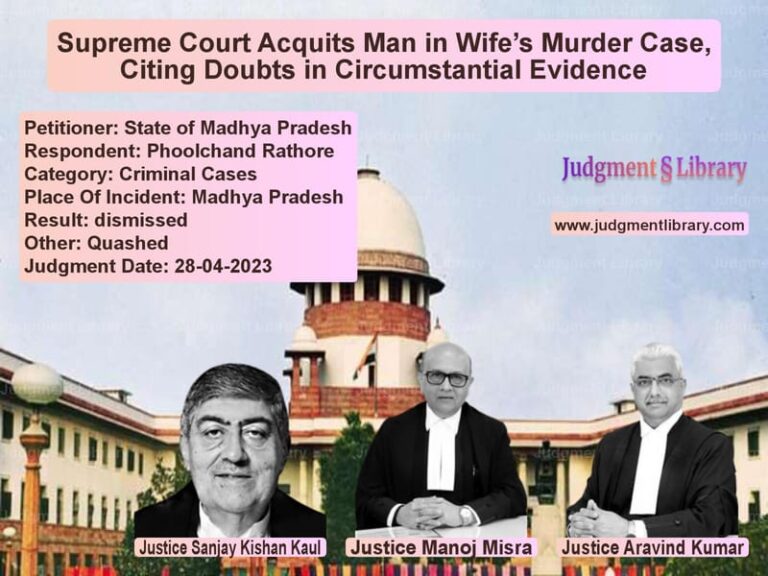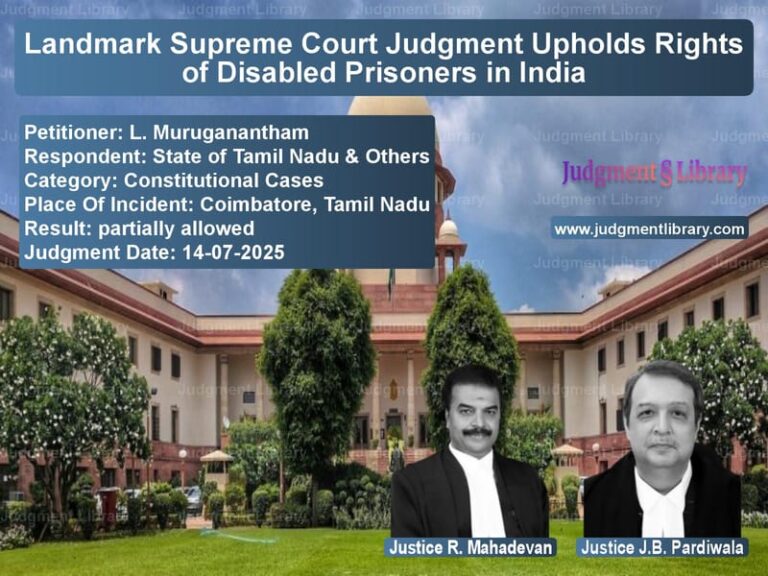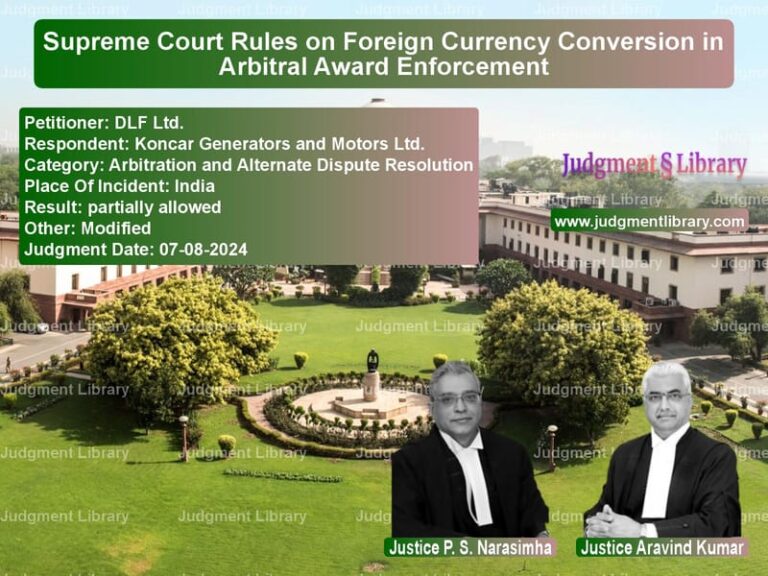Supreme Court Grants Probationary Release to Two Convicts in Kidnapping for Ransom Case
The Supreme Court of India, in the case of Satish @ Sabbe & Vikky @ Vikendra alias Virendra vs. The State of Uttar Pradesh, delivered a significant judgment concerning the premature release of prisoners convicted under Section 364A of the Indian Penal Code (IPC). The case revolved around whether two convicts serving life imprisonment for kidnapping for ransom were eligible for premature release based on their conduct and the principles of reformation.
The Court ruled that the rejection of their premature release applications was arbitrary and directed the government of Uttar Pradesh to grant them release on probation as per the provisions of the UP Prisoners Release on Probation Act, 1938.
Background of the Case
The case pertained to the kidnapping of one Vishal Sarawat on 12th June 2002. The victim was lured to the house of an acquaintance, Ramvir Rana, where he was drugged and held hostage by the accused—Satish, Vikky, and another individual, Ashok. The kidnappers demanded a ransom of Rs. 2 crores from the victim’s father, Nepal Singh. After several rounds of negotiations, the ransom was reduced to Rs. 32 lakhs, which was delivered to Ramvir’s house on 14th July 2002. However, a police raid led to the victim’s rescue and the arrest of Ramvir, while the other accused initially managed to escape.
Subsequent investigation and trial proceedings led to their conviction under Section 364A IPC (kidnapping for ransom) and Section 25 of the Arms Act. The Additional Sessions Judge, Fast Track Court-I, Ghaziabad, sentenced them to life imprisonment along with a fine of Rs. 10,000. Their appeals before the Allahabad High Court were dismissed, with the court upholding their conviction and sentence.
Petitioners’ Arguments
Satish and Vikky filed Special Leave Petitions (SLPs) before the Supreme Court, challenging the rejection of their premature release applications. Their counsel contended that:
- The rejection of their applications was arbitrary and failed to consider their good conduct in prison.
- Both petitioners had already served over 16 years of their sentence (22 years with remission), meeting the eligibility criteria for premature release.
- The rejection order relied on irrelevant factors such as their age (Satish being 54 and Vikky being 43), which had no bearing on their rehabilitation potential.
- Vikky had pursued multiple educational programs in prison, including degrees in the humanities and certifications in human rights and environmental studies, demonstrating his reformation.
Respondent’s Arguments
The State of Uttar Pradesh opposed the premature release, arguing:
- The crime was heinous and involved holding a minor hostage for ransom.
- The petitioners were still relatively young and capable of committing further crimes.
- The victim’s family had expressed apprehensions regarding their release.
- The government authorities had advised against granting them release in the interest of public safety.
Supreme Court’s Observations
On the Principle of Reformative Justice
The Court emphasized the importance of reformative justice, stating that a civilized society must balance punitive measures with rehabilitation. Citing Maru Ram v. Union of India (1981) and Swamy Shraddhananda v. State of Karnataka (2008), the Court noted that:
- Rehabilitation is an essential component of criminal justice.
- First-time offenders should be given a chance to reintegrate into society.
- Reformation should be prioritized over retributive punishment, particularly when the convict’s behavior suggests rehabilitation.
On Procedural Irregularities in Rejection Orders
The Court found that the rejection of the petitioners’ premature release applications was based on vague reasoning rather than substantive legal criteria. It noted that:
- The rejection orders failed to consider the petitioners’ good conduct and lack of prior criminal history.
- The assessment was mechanical and did not examine whether they posed any real danger to society.
- The government had ignored the guidelines under the UP Prisoners Release on Probation Act, 1938, which mandated an assessment of antecedents and prison behavior.
On the Right to Fair Consideration for Premature Release
The Court reiterated that while remission is not an automatic right, executive authorities must apply their minds and exercise discretion fairly. It cited Shor v. State of Uttar Pradesh (2020) and Zahid Hussain v. State of West Bengal (2001), which held that premature release must be decided based on a convict’s conduct, not just the nature of their crime.
Final Judgment
The Supreme Court ruled in favor of the petitioners, ordering:
- The State of Uttar Pradesh must grant Satish and Vikky probationary release within two weeks.
- The government may impose reasonable conditions to ensure public safety.
- The authorities retain the power to recall the release in case of future misconduct.
Legal Implications
This judgment establishes key principles in premature release jurisprudence:
- Fairness in Remission Decisions: Government authorities must follow due process while rejecting remission applications.
- Rehabilitation as a Core Principle: The criminal justice system must focus on reformation, not just punishment.
- Judicial Oversight: Courts have the authority to intervene when executive authorities fail to exercise discretion judiciously.
Conclusion
The Supreme Court’s ruling in Satish @ Sabbe & Vikky @ Vikendra alias Virendra vs. The State of Uttar Pradesh highlights the judiciary’s commitment to upholding fairness in criminal justice. By ensuring the proper application of remission laws and emphasizing the importance of rehabilitation, the judgment sets a precedent for humane and balanced sentencing policies in India.
Petitioner Name: Satish @ Sabbe & Vikky @ Vikendra alias Virendra.Respondent Name: The State of Uttar Pradesh.Judgment By: Justice N.V. Ramana, Justice Surya Kant, Justice Hrishikesh Roy.Place Of Incident: Ghaziabad, Uttar Pradesh.Judgment Date: 30-09-2020.
Don’t miss out on the full details! Download the complete judgment in PDF format below and gain valuable insights instantly!
Download Judgment: Satish @ Sabbe & Vik vs The State of Uttar P Supreme Court of India Judgment Dated 30-09-2020.pdf
Direct Downlaod Judgment: Direct downlaod this Judgment
See all petitions in Bail and Anticipatory Bail
See all petitions in Custodial Deaths and Police Misconduct
See all petitions in Fundamental Rights
See all petitions in Public Interest Litigation
See all petitions in SC/ST Act Case
See all petitions in Judgment by N.V. Ramana
See all petitions in Judgment by Surya Kant
See all petitions in Judgment by Hrishikesh Roy
See all petitions in allowed
See all petitions in Modified
See all petitions in supreme court of India judgments September 2020
See all petitions in 2020 judgments
See all posts in Criminal Cases Category
See all allowed petitions in Criminal Cases Category
See all Dismissed petitions in Criminal Cases Category
See all partially allowed petitions in Criminal Cases Category







